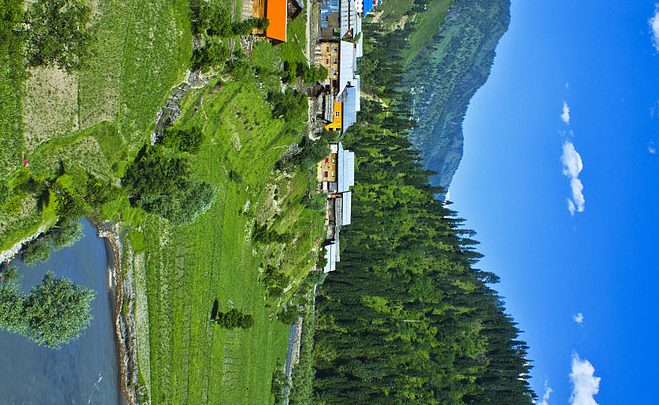The Conflict of Kashmir and the Role of the United Nations Organization

By Qasim Swati (United Kingdom)
Created in 1846 from the territories, formerly, under the Sikh Empire after the First Anglo-Sikh War (1845 – 1846) between the Sikh Empire and the East India Company, Jammu and Kashmir was a princely state of the British Empire in India from 1846 until 1947 and ruled by a Jamwal Rajput Dogra Dynasty and Sovereign Monarchy from 1947 to 1952. Currently, 43% of the region is administered by India, while controlling such areas, as the Kashmir Valley, Jammu, Ladakh, and Siachen Glacier. Pakistan is in control of Azad Kashmir and Gilgit – Baltistan, which constitutes, approximately, 37% of the region. However, the remaining 20% of the region is administered by China, which is mostly uninhabited and contains the Shaksgam Valley and the Aksai Chin region.
Apart from involving in various skirmishes and combats over control of the Siachen Glacier, India and Pakistan have fought three wars, as a result of the Kashmir conflict.
Also known, sometimes, as the First Kashmir War, the Indo-Pakistani War of 1947 – 1948 took place between the two countries over the princely state of Jammu and Kashmir. The second war fought between India and Pakistan over Kashmir was the Indo-Pakistani War of 1965, which witnessed the largest engagement of armoured vehicles and the largest tank battle since World War II and caused thousands of casualties on both sides. The third major war fought between the two nuclear countries, in association with the Kashmir issue, is known as the Kargil War, the Kargil Conflict or also referred to, as ‘Operation Vijay’, in India. Fought between May and June 1999, in the Kargil district of Kashmir and elsewhere along the Line of Control, this was an armed conflict between India and Pakistan, which caused huge damages and destruction on both sides, as well.
The people of Kashmir have been fighting for their right of self-determination for, almost, the last 71 years since the creation of two independent countries (Pakistan and India) of the subcontinent in 1947. This is the same right of self-determination of the people of Kashmir that has been endorsed in one of the recommendations made by the OHCHR (Office of the High Commissioner for Human Rights) to the Human Rights Council in the recent UN Report (2018) on Kashmir, which says, as ‘Fully respect the right of self-determination of the people of Kashmir, as protected under international law’. Self-determination is the ability or power to make decisions for yourself, especially the power of a nation to decide how it will be governed. This is why the people of Kashmir do not care for their lives, but make so many sacrifices and become the victims of persecution, abuse, tyranny and torture by the Indian security forces, because they want to be able to decide their own destiny themselves and choose for themselves how to live as a nation.
Established in 1945 after World War II, as a replacement or substitute for the ineffective League of Nations of 1920, the United Nations is an intergovernmental organization created for the promotion of international cooperation and maintenance of international order. Like other of its functions, the United Nations has always tried to resolve issues and conflicts among the nations and bring peace to the world. Although these were the early years of the establishment of the UN when the Kashmir conflict began, yet this international organization proved to be fully ready for cooperation with the two nations (India and Pakistan) for resolving this issue.
As part of its efforts for finding out an effective solution to the Kashmir problem, the United Nations set up the United Nations Commission for India and Pakistan (UNCIP), and its Security Council passed Resolution 47 on April 21, 1948, for imposing an immediate cease-fire between the two rival countries and paving the way for holding a plebiscite on giving the people of Kashmir the opportunity to decide whether to accede to India or Pakistan. For demilitarisation of the Indian and Pakistani forces in Kashmir and finding a solution agreeable to both India and Pakistan, the subcontinent was visited by the United Nations Commission for India and Pakistan three times between 1948 and 1949, but no satisfactory agreement was reached between the two hostile countries.
It was due to the peace process initiated by the UN for bringing an end to the Kashmir conflict that the UN Security Council President General, McNaughton, was assigned the task of meeting both Indian and Pakistani leaders in 1949 for the appropriate withdrawal and demilitarisation of both the forces of India and Pakistan. However, McNaughton’s mission did not succeed in the beginning, as it was rejected by India on several grounds. Anyway, the proposals presented by McNaughton bore fruit, as the Security Council passed the resolution for arranging the demilitarisation scheme which was, later, accepted by India on March 14, 1950, too.
The United Nations invited Sir Owen Dixon (a prominent Australian judge and diplomat) on May 27, 1950, to play his role as the official mediator of the UN between the governments of India and Pakistan for implementing the demilitarisation proposals for the State of Kashmir made by McNaughton. Dixon offered alternative suggestions and proposals for the demilitarisation and holding of a fair plebiscite before the Indian and Pakistani leaders on various occasions in order to convince them for resolving the issue, in light of his professional experience, but his proposals were rejected, most of the time, by the Indian Prime Minister (Jawaharlal Nehru) and sometimes, by Pakistan.
Despite the failure of Sir Owen Dixon to convince the two countries for reaching an agreement on demilitarisation of Kashmir, the United Nations continued its efforts to sort the Kashmir issue out and bring the relations between India and Pakistan to normal. Thus, the Security Council appointed Dr. Frank Graham as the representative for India and Pakistan on behalf of the UN on April 30, 1951, for making the two countries willing to come to an agreement on demilitarising Kashmir and pave the way for holding a plebiscite.
Like his predecessors, Dr. Frank Graham offered a demilitarisation plan before holding a plebiscite in Kashmir, but it was India again to reject the plan and not to agree with what the UN representative for India and Pakistan wanted to suggest for resolving the Kashmir issue. Not only this, but India also refused to accept an alternative proposal by Dr. Frank Graham by binding both the countries to gradually and proportionally decrease the number of their forces to a minimum that they had in Kashmir. The interesting point during the process of mediation and arbitration by Dr. Frank Graham is that he faced rejection for any of his proposals for resolving the conflict from India whenever he suggested a new plan, but did not lose his heart and was ready to propose a new plan one after the other. However, he got shocked and disheartened, on several occasions when India refused to accept any proposal for the resolution of the problem by him, as a mediator and a representative of the United Nations for India and Pakistan, in connection with the Kashmir conflict. As a result, he reported his failure, on three occasions during his mediation process, to the Security Council by not being able to bring the two hostile countries to the negotiating table successfully.
The UN did not give up its efforts for resolving the Kashmir issue between India and Pakistan, despite the failures of its several representatives to successfully mediate between the two countries and set up a United Nations Military Observer Group in India and Pakistan (UNMOGIP) for the observation and reporting of any violation of the ceasefire that would take place, as a result of the Karachi agreement signed by both India and Pakistan in March, 1951.
Last but not least, a funny attitude adopted by India, in association with the ceasefire violations, is that India is not now ready even to accept the role of the UNMOGIP), established by the UN for keeping an eye on the commitment of the two nations to the ceasefire agreement. Thus, India puts the mandate or authority of the UNMOGIP aside by violating the ceasefire agreement that took place between the two countries with the cooperation of the United Nations and is not willing to let the UNMOGIP observe and report any ceasefire violations. Notwithstanding the hesitation of India to accept the role of the UN in resolving the Kashmir issue (particularly, to obey the ceasefire agreement), the Secretary-General of the United Nations is of the opinion that the UNMOGIP has still the same power to observe and report the ceasefire violations between the two countries and maintain the peace process.
In spite of all these efforts made by the United Nations for sorting out the Kashmir conflict, India has proved at, almost, every stage to interrupt the peace process in some way and keep the international community away from meddling in and touching the topic of the issue of Kashmir, because India is fully aware of the outcome of the peaceful solution of the Kashmir which can result in loss for India, and India never wants to lose such a significant piece of land on Earth, as the region of Jammu and Kashmir. Therefore, India neither wants to get the international community (like the UN) involved in the peace process of the issue of Kashmir nor does it want Pakistan to support and help the innocent people of Kashmir in getting their right of self-determination.
However, this is not the solution of the problem to leave India alone to do whatever it wants and does, as the people of Kashmir have been suffering for the last, almost, seventy-one years at the hands of the Indian forces and the Hindu extremist groups, factions and organizations, as a punishment for their determination and struggle to live as a free, independent and autonomous nation. Thus, this is hugely important for every human being in the world and, specifically, India, Pakistan and the United Nations, to find a suitable solution for enabling the people of Kashmir to decide their own destiny and live as a proud and free nation.
We hope that, one day, the United Nations may be able to succeed in its efforts for resolving the Kashmir conflict we have already seen either in the form of the successful East Timor Special Autonomy Referendum, held on 30 August, 1999, in which the East Timorese people voted for independence from Indonesia and now live their lives as a separate, free and independent nation or the people of Kashmir should be given the opportunity to use their natural right of self-determination in the form of the referendum that passed with 98.83% of the vote of South Sudanese people on 9 July, 2011, which liberated them, as an independent nation by seceding from the Republic of Sudan.
Qasim Swati is a freelance journalist, writer, and human rights activist, based in the UK, and can be reached at https://qasimswati.com or mailto:info@qasimswati.com.


Excellent blog post.
Thanks, Mr. Shah, for your comment on the article.